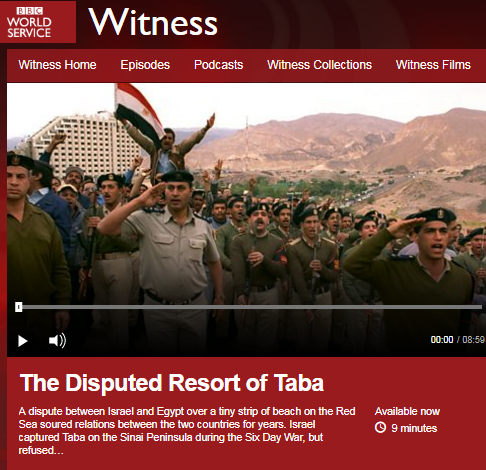BBC Arabic’s Sally Nabil in Cairo has recently produced two items on the topic of what remains of the Egyptian Jewish community. On September 18th a filmed report for BBC television news programmes was also published on the BBC News website under the title “Egypt’s Jewish community’s lost future“. The synopsis reads:
“The Jewish community in Egypt is on the verge of disappearing.
Up until the 1950s, as many as 100,000 Jews called the country home – now, just 12 remain.
The BBC’s Cairo correspondent Sally Nabil explains why.”
However, that ‘explanation’ comes in the form of just three short sentences in Nabil’s filmed report.
“There were around 100,000 Jews in Egypt. Most of them were forced to leave in the 50s and 60s. Egypt was at war with Israel and the government suspected many of them of being spies.”
Sally Nabil also produced an audio version of her report for the BBC World Service radio programme ‘Newshour’. That item (available here from 00:49:15) was broadcast on September 18th and presenter James Menendez introduced it in a very similar fashion.
“Now there used to be about 100,000 Jews in Egypt. Most of them were forced to leave in the 1950s and 60s. Egypt was at war with Israel and the government suspected that many of them were spies.”
No further explanation of why only 12 Jews remain in Egypt today is provided in Nabil’s audio report.
Of course the persecution of Egyptian Jews did not, as the BBC suggests, begin in the 1950s and 60s, but years before “Egypt was at war with Israel” and even before Israel existed.
“The next step was the nationality laws of 1927 and 1929, which favored jus sanguinis (or right of blood). An Egyptian was from then on defined as somebody who had Arab-Muslim affiliation.
The London Convention (1936) granted Egypt independence under King Farouk, and it was followed by a worsening of the nationality laws. According to additional nationality laws (in 1950, 1951, 1953, and 1956), autochthonous Jews became stateless: 40,000 people were turned into “foreigners” in their own country. In 1956, after the Sinai War, a new dimension was added: Egyptian nationality was taken away from anyone who committed acts in favor of enemy states or states with no relations with Egypt. In practice, all Jews were suspected of dual loyalty. This led ultimately to the accusation that all Jews were Zionists.”
“In Egypt, a long process of discrimination in the public service began in 1929. In 1945-1948, Jews were excluded from the public service. In 1947, Jewish schools were put under surveillance and forced to Arabize and Egyptianize their curricula. Community organizations were forced to submit their member lists to the Egyptian state after May 1948 and until 1950. In 1949, Jews were forbidden to live in the vicinity of King Farouk’s palaces.”
Anti-Jewish violence, rioting and economic discrimination also predated the existence of Israel.
“Jews in Egypt faced acute problems in the 1940s but these did not set their mass departure in motion. Rioting against Jews occurred in November 1945, then resumed in June-November 1948, the latter time inspired by the war with Israel. An amendment to the Egyptian Companies Law dated July 29, 1947, required that 40 percent of a company’s directors and 75 percent of its employees be Egyptian nationals, causing the dismissal and [loss of] livelihood of many Jews, 85 percent of whom did not possess Egyptian nationality.”
Clearly these two BBC reports have in no way fulfilled the claim of explaining to audiences why no Jewish community to speak of remains in Egypt and the promotion of the simplistic notion that Jews were forced to leave in the 50s and 60s because they were “suspected […]of being spies” whitewashes a much more complex story.




